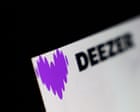Up to seven out of 10 streams ofartificial intelligence-generated musicon the Deezer platform are fraudulent, according to the French streaming platform.
The company said AI-made music accounts for just 0.5% of streams on the music streaming platform but its analysis shows that fraudsters are behind up to 70% of those streams.
AI-generated music is agrowing problem on streaming platforms. Fraudsters typically generate revenue on platforms such as Deezer by using bots to “listen” to AI-generated songs – and take the subsequent royalty payments, which become sizeable once spread across multiple tracks.
The tactic aims to evade detection measures triggered by vast listening numbers for a small amount of bogus tracks.
Thibault Roucou, the director of royalties and reporting at the Paris-based platform, said the manipulation of AI-generated music was an bid to “get some money from royalties”.
“As long as there is money [in fraudulent streaming] there will be efforts, unfortunately, to try to get a profit from it,” he said. “That’s why we’re investing in fighting it, because we know it’s not going away and we need to be one step ahead every time.”
Deezer deploys a tool it says can detect 100% AI-made content from the most prolific AI music models such as Suno and Udio.
Deezer said the AI-generated music streamed by fraudsters ranged from fake pop and rap music to artificial mood tracks. The platform blocks royalty payments for streams it has identified as fraudulent.
Deezer revealed in April that AI-generated music now represents 18% of all uploads to its platform, or 20,000 tracks per day. The company said it was removing all fully AI-generated content from its algorithmic recommendations. Deezer has more than 10 million subscribers worldwide, whilemarket leader Spotifyhas 268 million.
Roucou said he did not know who was behind the fraudulent streams but the perpetrators appeared to be “organised”. The global streaming market was worth $20.4bn last year, according to trade body the IFPI, representing a sizeable target for fraudsters.
In itslatest global music report, the IFPI said fraudulent streaming steals money that “should be going to legitimate artists”. It said generative AI had “significantly exacerbated” the problem.
Last year, a musician in the US, Michael Smith, was charged in connection with a scheme to create hundreds of thousands of AI-generated songs and stream them billions of times, obtaining $10m in royalty payments.
